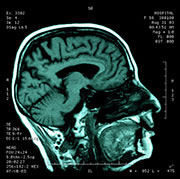- Could Your Grocery Store Meat Be Causing Recurring UTIs?
- Are You Making This Expensive Thermostat Error This Winter?
- Recognizing the Signs of Hypothyroidism
- 10 Strategies to Overcome Insomnia
- Could Artificial Sweeteners Be Aging the Brain Faster?
- Techniques for Soothing Your Nervous System
- Does the Water in Your House Smell Funny? Here’s Why
- Can a Daily Dose of Apple Cider Vinegar Actually Aid Weight Loss?
- 6 Health Beverages That Can Actually Spike Your Blood Sugar
- Treatment Options for Social Anxiety Disorder
Even Mild Concussion Can Cause Thinking, Memory Problems: Study


A mild or moderate concussion may have longer-lasting consequences than previously realized, a new study suggests.
By comparing brain imaging studies and thinking tests between healthy people and those with relatively minor concussions, the researchers found that the recovery of thinking skills can take a long time. Minor concussions can be caused by events such as falling off a bike, being in a slow-speed car crash or being hit in a fist-fight.
Initially, those with concussions had thinking and memory test scores that were 25 percent lower than those in healthy people. One year after injury, however, while the scores for those with and without concussions were similar, those who had had brain injuries still had evidence of brain damage on imaging tests, with clear signs of continued disruption to key brain cells.
The findings are especially important because 90 percent of all traumatic brain injuries are mild to moderate, said Andrew Blamire, senior author of the study and professor of magnetic resonance physics at Newcastle University, in the United Kingdom.
And, Dr. Michael O’Brien, director of the sports concussion clinic at Boston Children’s Hospital, pointed out that “it’s really good for people to know — those who are suffering with school performance, physical performance and even social issues — the fact that there is actual structural damage, even a year after the injury.”
The research was published online July 16 and in the Aug. 5 print issue of Neurology.
A concussion is a type of brain injury that occurs when the head hits an object, when a moving object strikes the head, or when the head experiences a sudden force without being hit directly. There are about 2 to 4 million concussion injuries from sports and recreation in the United States every year, according to the American Academy of Neurology. Most concussions result in full recovery.
Kids are particularly vulnerable to the impact of concussions because they are still developing, and they can easily accumulate multiple injuries over the years, said O’Brien. In addition, the pressure to perform on the field, and in the classroom, can slow recovery, he added.
The question of how brain injury affects thinking has been difficult for experts to answer because while CT and MRI scans can show injury to a particular area, it may not show signs of more diffuse damage. As a result, researchers have not been able to show clear connections between what they find on imaging studies and tests of thinking, Blamire said.
Complicating the problem is the fact that symptoms alone often do not tell the whole story. “The level of symptoms doesn’t always correlate to the level of damage,” said O’Brien. And, other issues, like depression or low thyroid levels can mimic concussion, he added.
For the study, 44 people with mild concussion and nine people with moderate concussion were compared to 33 participants with no brain injury. All of the participants took thinking and memory skills tests and had an MRI scan that was particularly sensitive to brain cell damage.
Those with concussions had scans an average of six days after their injury. A year later, 23 of those who had concussions had another MRI scan and re-took the thinking and memory skills test.
A year after the initial symptoms of a mild or moderate concussion had passed, some evidence of brain damage was still present, the researchers found.
What is especially challenging is the fact that every patient is different, said Blamire. “While injury severity does relate to outcome, it isn’t straightforward to predict precisely,” he noted.
O’Brien said that the standard of concussion care now is based on symptom reporting and using protocols that require people to commit an initial period of time to suspending physical and mental activity, followed by a very gradual increase in activity. But knowing when it’s safe to return to high levels of physical and mental activity isn’t easy, he explained.
“There are downsides to returning athletes to full activity too early: their likelihood of getting re-injured is higher, and recovery may be prolonged,” O’Brien said.
More information
Learn more about concussion from the U.S. Centers for Disease Control and Prevention.
Source: HealthDay
Copyright © 2026 HealthDay. All rights reserved.










